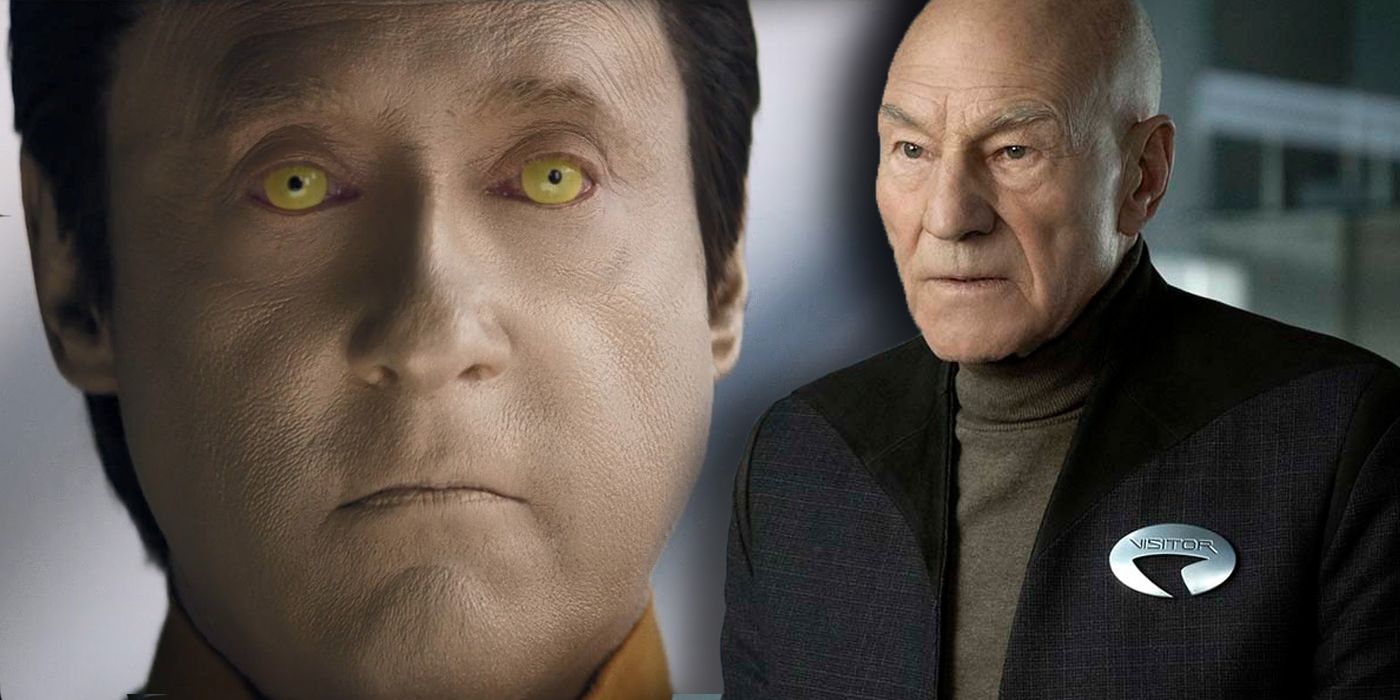WARNING: The following article contains spoilers from "Remembrance," the series premiere of Star Trek: Picard, now streaming.
In one of Captain Jean-Luc Picard's first truly transcendent moments on Star Trek: The Next Generation, Patrick Stewart's iconic Starfleet hero defends the rights of Brent Spiner's Lieutenant Commander Data in "The Measure of a Man." When Starfleet tries to disassemble Data and duplicate the technology behind him, Picard and Whoopi Goldberg's Guinan defend their crewman with an impassioned speech.
"In the history of many worlds there have always been disposable creatures," Guinan said. "They do the dirty work. They do the work that no one else wants to do because it's too difficult, or to hazardous. And an army of Datas, all disposable, you don't have to think about their welfare, you don't think about how they feel. Whole generations of disposable people."
While Picard won the battle for Data that day, it looks like he didn't win that proverbial war, as Star Trek: Picard shows what happens when that "army of Datas" gets built.
The film Star Trek: Nemesis saw Data sacrificing himself to save Picard. But he leaves behind a similar, slightly less advanced android in B-4, who Data seemed to program with his memories before his departure. While the appearance of a disassembled B-4 made many fans though that he would play a part in Picard, roboticist Dr. Agnes Jurati (Alison Pill) disputes the notion. She tells Picard that, after the events of Nemesis, B-4 was discovered to be too technologically inferior to Data, and the transfer of consciousness had failed for the most part.
That did not mean he was not useful, though. Enter Lieutenant Commander Maddox, the Starfleet officer who attempted to commandeer Data back in "The Measure of a Man." Although he was deprived his opportunity back in TNG, it seems he got a second chance with B-4. Recruiting Agnes, he led the Divison of Advanced Synthetic Research and succeeded in appropriating Data's tech to create androids (referred to as synthetics or synths in Picard).
What happened after reiterated the evergreen lesson of "be careful what you wish for." An interview with Picard provides the events that happened next. Rogue synthetics hacked Mars' defense systems, prompting the destruction of the Utopian Planetia Shipyard and igniting the red planet's atmosphere. The result was horrific, with over 92,000 casualties. This also ties Picard back to "Children of Mars," the latest episode of the Short Treks series that saw the event from the viewpoint of two schoolchildren.
Suffice it to say, the fallout from the attack on Mars was massive. Synthetics were then banned, considered to be a threat to humankind. Maddox, whether out of despair with what his creations did or fear of backlash, has disappeared, with his division getting gutted. The tragedy has now made androids what the late Data is in Picard's mind: Merely a memory, a sign of bygone days that ended in the loss of life.
But within the cold steel left by the synthetic ban, there appears to be a sprout of life. "Remembrance" debuts Dahj (Isa Briones), a mysterious young woman whose life instantly changes when she's attacked in her apartment. The wannabe roboticist suddenly has combat skills, and her mind brings about the image of Picard, with an inner voice telling her to trust him.
As it turns out, that inner voice belongs to Data. After seeing Dahj's face in one of Data's paintings, appropriately titled "Daughter," he figures out that indeed she is an offspring of the android. Agnes reasons that, though Data is physically gone, a single positronic neuron could be used to reconstitute his "essence" into another being. Not only that, but Dahj is not the only daughter of Data. It turns out that the reconstituting is done in pairs, and the end of the episode reveals that Dahj has an identical twin named Soji, who is currently working on a Romulan reclamation site out of what appears to be a Borg Cube.
This is not the first time Data has experimented with parenthood. He also created an android out of his positronic brain template and called her Lal in TNG. Lal exceeded Data's capabilities in several ways, including using verbal contractions and even feeling emotions. But her evolution exceeded the capabilities of Dr. Noonien Soong's technology, and she died at the end of her debut episode. But Dahj and Soji's existence shows an extreme escalation in the tech, as they exist as sentient androids with realistic human bodies, a technology that shouldn't exist for at least 1000 years.
So how do Dahj and Soji exist? All signs at this moment point to Maddox, who theorized about cloning Data's essence in the first place. It could be possible that, while in hiding, he used the remaining B-4 positrons, along with the image from Data's painting, to create Dahj and Soji. He could've made them pass as human to avoid them being hunted by Starfleet, then sent them into the world, implanting them with false memories so they had no knowledge of their true origin.
Since Dahj is seemingly taken off the board by the end of the episode, Soji serves as an interesting variable in this equation as well. Soji mentions her twin sister in her scene, though Dahj makes no reference to having one when talking with Picard. The two have the same necklace, which they both claim to have received from their father. But considering the divergent paths the two have taken, it could be possible they were raised by different families. And seeing how Romulans had been attempting to capture Dahj when she died, Soji could have been working to reunite the sisters, perhaps so they could put their two positronic brains together to update the Borg technology.
Whatever the case may be, Picard has already painted an illustrative picture of what happened to android technology over the past 20 years. Why did the synthetics cause the attack on Mars? Where is Maddox now? How will Soji's work with the Romulans and Borg cause further problems? It looks like the new series will tackle the issue in shades of grey, rather than binary.
Star Trek: Picard stars Patrick Stewart, Alison Pill, Michelle Hurd, Evan Evagora, Isa Briones, Santiago Cabrera and Harry Treadaway. A new episode arrives each Thursday on CBS All Access.



